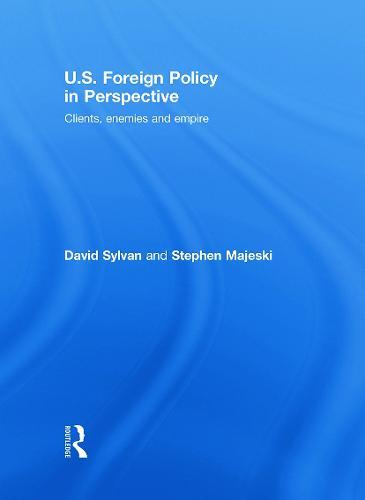Full Product Details
Author: David Sylvan (Graduate Institute of International Studies, Geneva, Switzerland) ,
Stephen Majeski (University of Washington, USA)
Publisher: Taylor & Francis Ltd
Imprint: Routledge
Weight: 0.810kg
ISBN: 9780415701341
ISBN 10: 0415701341
Pages: 352
Publication Date: 05 February 2009
Audience:
College/higher education
,
General/trade
,
Tertiary & Higher Education
,
General
Format: Hardback
Publisher's Status: Active
Availability: In Print

This item will be ordered in for you from one of our suppliers. Upon receipt, we will promptly dispatch it out to you. For in store availability, please contact us.
Reviews
Empirical diplomatic history and theory at its best. This masterful, rigorous scholarship takes a long-term perspective, informed by rich case studies, to challenge in a pathbreaking interpretation many conventional wisdoms about the wellsprings of American foreign policy. Clear yet sophisticated at the same time - a rare combination. Must reading for future research. Charles W. Kegley, Distinguished Pearce Professor of International Relations Emeritus at the University of South Carolina, USA; Vice Chair of the Carnegie Council for Ethics in International Affairs, and President of the International Studies Association 1993-1994 In this lucid, erudite, penetrating book, David Sylvan and Stephen Majeski turn standard analyses of U.S. foreign policy upside down. The tale they tell is one of means shaping ends, of instruments driving policies, of bureaucracies creating rather than serving national interests. Sylvan and Majeski's cybernetic account of U.S. foreign policy is shockingly compelling - conceptually sound and empirically rich. This book is a must-read for any serious student of U.S. foreign policy. David A. Welch, Professor of Political Science, Director, Trudeau Centre for Peace and Conflict Studies, University of Toronto, Canada Sylvan and Majeski flip a Gestalt switch to illuminate the continuity of US foreign policy. They consider it the product not of some conjectured grand strategy, but of the policy instruments available to policymakers. By examining US foreign policy from its actual means, not its putative ends, Sylvan and Majeski produce a fresh and compelling account that amounts to a more nuanced understanding of the inner workings of imperial politics after colonialism. Gavan Duffy, Syracuse University, USA
Author Information
David Sylvan is Professor of International Relations and Director of publications at the Graduate Institute of International Studies, Geneva. Previously he was Associate Professor at the University of Minnesota and Associate and Assistant Professor at Syracuse University. His research and teaching interests are foreign policy analysis, intervention, international relations theory, sociology of international relations, social theory, topics in political economy, computational modelling and research design. Stephen Majeski is Professor of Political Science and Department Chair at the University of Washington, Seattle. His research and teaching interests are international relations theory, international conflict and cooperation, U.S. foreign policy, foreign policy analysis, mathematical modeling, computational modeling, agent-based modeling, experimental analysis and statistics.




